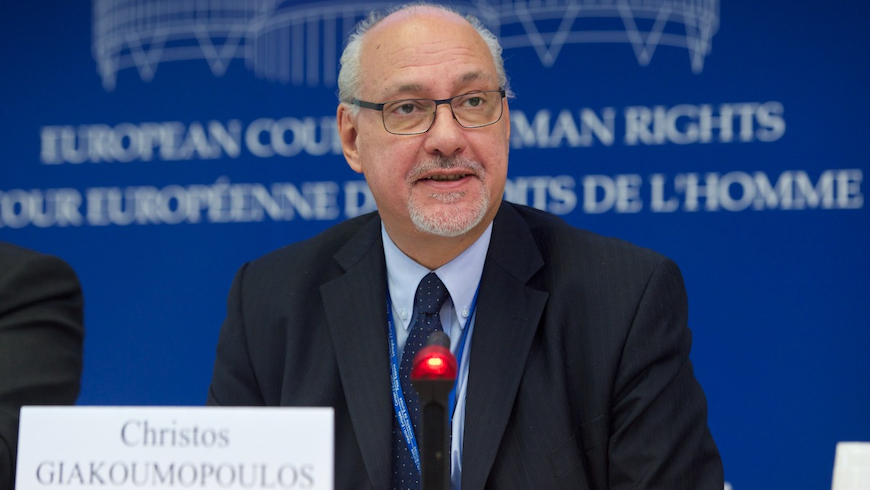Interview for Vedomosti with Christos Giakoumopoulos
"Russia’s exit from the Council of Europe would cause Europe more problems", Interview by Anastasiya Kornya
17 May 2018, Vedomosti
The Council of Europe's Director General Human Rights and Rule of Law Christos Giakoumopoulos – on Russia's possible expulsion from the Council of Europe and the execution of European Court of Human Rights judgments
1. Russia is refusing to execute a number of leading judgments of the European Court of Human Rights, Russian delegation to the Parliamentary Assembly of the Council of Europe (PACE) has been deprived of voting rights, and Russian politicians are increasingly raising the issue of Russia's possible exit from the Council of Europe. Is this seen as a real prospect in Strasbourg?
The question of a possible exit from the European Convention on Human Rights is indeed mentioned in statements by Russian politicians. But it is not at all on the agenda of either the Council of Europe or the Russian Government, if I rightly understand the situation. There is only one example of a country being expelled from the Organisation in connection with a major internal political crisis, and that was Greece at the time of the colonels' regime. This is not quite a fortunate example: Greece returned to the Council of Europe a few years later, and the whole process was complicated by the aggravation of the military and political crisis. The country ended up ratifying the Statute of the Council of Europe and the European Convention twice.
In any case, exiting from the organisation or suspending membership is a political and rather lengthy process. Of course, there is a certain divergence in positions, first and foremost focusing on the fact that the Russian delegation has not been taking part in the PACE proceedings after the latter adopted its resolutions in response to the well-known events of 2014. Differences of opinion over the implementation of European Court of Human Rights judgments alone would not have created such a problem. We encounter differing views or even misunderstandings on the part of other countries too from time to time. I would say that this is a natural phenomenon as we try to find some kind of common denominator for 47 States with differing legal standpoints. And we have a sufficient array of tools for overcoming these difficulties: dialogue between judges, cooperation projects, dialogue within the intergovernmental committees of the Council of Europe – all this opens up possibilities to arrive at a mutual understanding. Let me give an example: the process of reviewing the Council of Europe Convention on the protection of personal data went on for two years but, as a result, we managed to reach a compromise on numerous issues in the course of complex but constructive negotiations involving Russia and the European Union. So our ways and methods for resolving contradictions are quite effective.
2. The Committee of Ministers of the Council of Europe has initiated a special procedure in respect of Azerbaijan in connection with its failure to comply with of a judgment of the European Court of Human Rights. In theory, a procedure of this kind can lead to a country being expelled from the Council of Europe. Could a similar procedure be launched against Russia?
Such a question is not on the agenda. The Committee of Ministers initiated that procedure in respect of Azerbaijan because it considered that there had been a refusal to execute the judgment. In accordance with the Convention, the question has now been referred to be considered by the European Court of Human Rights and it is ultimately for the Court to decide whether or not there has been a refusal. As regards the cases being examined by the Committee of Ministers of the Council of Europe in respect of the Russian Federation, there is not a single case among them where we are confronted with a refusal to execute a judgment of the European Court.
3. But what about the payment of compensation to the shareholders of YUKOS? The Constitutional Court has blatantly held that Russia would not pay.
There are situations where the Committee of Ministers of the Council of Europe monitors the execution of a European Court of Human Rights judgment over years. Obstacles of a legal, social, economic and political nature do arise during the execution process. But that does not mean that the State in question is refusing to execute a judgment. It just means that the process is moving slowly. At the end, measures are taken and the obstacles are overcome.
The Constitutional Court held that the State could not pay pecuniary compensation from the State budget, because that would create a problem of a constitutional nature. That does not mean that there is no other possibility of executing the judgment.
Indeed, we are confronted with difficulties when discussing the execution of the judgment. For that reason, it is important to continue dialogue. I would recall that in its judgment the Constitutional Court referred to the possibility of creating a mechanism for compensating shareholders. That fact alone means that the latter judgment cannot be seen as an outright refusal to implement the judgment of the ECtHR. On the contrary, we have to look at the avenues to follow that were pointed to in the Constitutional Court’s judgment. In addition, I would recall that Russia has already paid the amount of 300,000 euros awarded by the ECtHR for costs and expenses and accordingly notified the Committee of Ministers of the Council of Europe.
4. It is already over a year now that Russia has not paid the full amount of its contribution to the Council of Europe. How much longer can Russia go on doing that, and what are the possible consequences?
It is not possible to speculate on these issues. The question must be submitted for discussion by the Committee of Ministers of the Council of Europe and it is for the Committee to decide what to do when a State does not pay its contributions. There is a Committee of Ministers’ resolution on this question which says that measures can be taken after non-payment for a period of two years. But defaulting on budget contributions does not automatically result in suspended membership and expulsion. This is a question that must be resolved separately by the Committee of Ministers. Of course, various scenarii are up for discussion. I personally think that Russia’s exit from the Council of Europe would cause Europe more problems. One of the main problems would be that Russian citizens would be deprived of the additional means of legal protection afforded by the European Convention on Human Rights. And moreover, everything we have striven to build over the last 20 years, - that is a common legal space from the Pacific to the Atlantic, - would be jeopardised.
Of course, I am not saying that Russia would not respect human rights without the Council of Europe and that other States in the Council of Europe will do everything the right way. But if Russia is not a member of our Organisation, we will follow different avenues. This would be a massive blow to the mechanism for coordinating joint decisions on a full spectrum of common problems in Europe. The great advantage of the Council of Europe is that our Organisation was built upon common values forged as a result of the Second World War. These are primarily the value of human life and dignity, prohibition of slavery, torture, and others. A very fine balance has been found in terms of how to regulate the life of society while respecting those values and without upsetting the cohesion of society or causing its fragmentation. I emphasise that this is a fine balance that needs to be maintained. And we need our member States to be involved in this process. That is our vision of an organisation that protects rights and freedoms. Economic freedoms provide additional opportunities, although they are sometimes perceived as secondary compared to the most fundamental values which shape the development of modern society.
5. The President of Russia's Constitutional Court, Valeriy Zorkin, said on Tuesday that in Europe people have got carried away with protecting individual interests to the detriment of those of the community. Do you agree?
It is true that there is more and more debate on this topic. Excessive individualisation of human rights can lead to fragmentation and wreck social cohesion. But I don't see a great risk of this happening. Where I see more of a risk is that up to now we have put a lot of efforts into protecting civil and political rights and not enough into protecting social rights. Whereas the UN's Universal Declaration of Human Rights refers to all human rights, which are recognised by the Council of Europe as indivisible, at the Council of Europe we have two separate instruments, two fundamental conventions for each of these categories of rights and two different mechanisms for their supervision. One is the mechanism of rights protection through the ECtHR, and the social rights are enshrined in the European Social Charter, whose monitoring mechanism is not of the same judicial nature. Rights to a salary, a decent pension, access to health care and education, all those rights are directly guaranteed by the European Social Charter and not by the European Convention on Human Rights. Unfortunately, many people turn to the ECtHR in order to uphold their social rights, as they are unaware of the European Social Charter.
6. Does that mean that Russian citizens can appeal to the Social Charter if, for example, they are unhappy with the outcome of the pensions reform which is now being debated? What is the procedure for doing so?
These issues are dealt with by the European Committee of Social Rights. This is a different mechanism altogether which accepts collective complaints from trade union organisations and NGOs concerning structural problems in the States in question. That said, Russia has not yet ratified the additional protocol to the Charter accepting the collective complaints system, meaning that such complaints cannot be lodged against Russia at present. There is however a system of monitoring and reporting. While not having accepted the collective complaints procedure, Russia nevertheless regularly submits reports under the Charter's monitoring system. And this is a very important mechanism: a State that undermines its system of social protection may be regarded as engaging in unfair competition and social dumping; or this can lead to social unrest and breakdowns of social cohesion, thus creating serious political problems too. Therefore, the European Union, which is originally an economic integration organisation, has been compelled in more recent times to include the protection of social rights among its pillars. This seems to be an indispensable measure today and it is gradually starting to be implemented, despite disagreements of various nature.
7. What are the steps that must primarily be taken to resolve the ongoing crisis in cooperation with Russia?
The most important thing is to create the momentum and an opportunity to ease the tension. One cannot say that no efforts are being made in this direction. Certain steps are being taken both in Strasbourg and in Russia. But this issue can and must be resolved first and foremost in political settings. A lot can be done, including through procedural and legal steps, but if such steps are attempted under pressure, with each side shifting blame on the other one, there is very little likelihood of resolving anything whatsoever. The Council of Europe is taking all available opportunities to find acceptable solutions. These must also be discussed and given concrete form in the Council of Europe's Member States. A lack of productive dialogue would in any event lead to an impasse. That would not bring benefit to anyone, except those who are counting on quick political gain from further deterioration of what is already an alarming situation.




